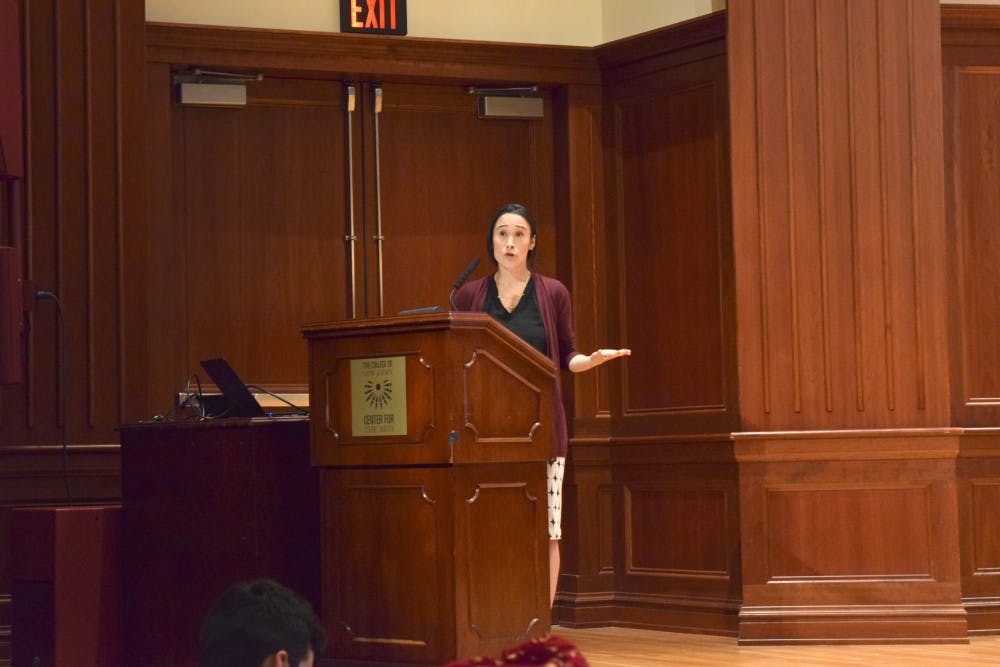By Pooja Paidipalli
Correspondent
If someone had asked Victoria Jennings-Kelsall about her identity five years ago, she said she would have described herself as a daughter, a sister and a wife. She was happily married to a U.S. Navy SEAL, who was proud of his profession. However, on Aug. 6, 2011, her world stopped. A friend of her husband’s, also a Navy SEAL, showed up at her front door and told her what every military spouse fears the most: her husband would not be coming home.

His aircraft was shot down over Afghanistan in the single most devastating disaster in U.S. SEAL history, according to TIME. The military Chinook helicopter crash resulted in the death of 17 Navy SEALS and 13 other Americans. Suddenly, the woman who was once a wife is now a widow.
Jennings-Kelsall presented her lecture, “Communal Coping: How it Helps, How it Hurts and How we Heal,” to a nearly-full Mayo Concert Hall as part of the Brown Bag series on Friday, Sept. 30. She hoped to offer guidance to others who have gone through — or are currently undergoing — a period of grief.
She is a PhD candidate at Pennsylvania State University and studies social support and interpersonal communication. This entails far more than helping people through everyday stressors like a failed exam or breakup. Her field of study helps people going through dramatic turning points in life, such as deaths of loved ones or terminal illnesses.
Jennings-Kelsall described the first few weeks after her husband’s death as “living in a blur.” She felt lonely, despite having family and friends to support her. Truthfully, these people did not understand her pain, and all she wanted was emotional support, she said.
“I wanted to feel like the world that slipped from under my feet would come back,” Jennings-Kelsall said.
In spite of having various support groups in her family, the Special Operations Community, Naval Special Warfare (NSW) Community and the NSW Gold Star Community, she could only find real emotional support among the Gold Star wives of other men who perished in the same tragedy. They were the only ones who truly understood her pain, she said.
Jennings-Kelsall began her communal coping experience alongside the other Gold Star wives. She described communal coping as an “interactive attempt of multiple people to confront similar stressors,” where participants can reap the benefits of strength in numbers. Although each woman’s loss was affected by individual variables, such as their own support systems and relationships with their husbands, they had nearly identical stressors.
Stressors are the problems people encounter following a tragedy. In the Gold Star wives’ cases, stressors included loss, uncertainty, exposure and exploitation. Many of the women experienced uncertainty about the future, especially those whose husbands were the breadwinners of the family, or those who had children.
They also experienced exposure to the news media. Reporters who came to their houses were described as “pests” who simply wanted a good story, despite the SEALs lifestyle to be one of utter secrecy. Knowledge of any operational information is a safety concern that could potentially affect the lives of other SEALs and their loved ones.
“People were really getting into our business,” Jennings-Kelsall said.
As for the communal coping process, while there are great benefits, there are also significant disadvantages.
Those who participate in the process have ample resources and communities in which to turn. Jennings-Kelsall said going through a healing process with others helps to give a new perspective on tragedy. This “power in numbers” concept helped her gain a better understanding of her stressors and reassured her that her grieving and healing process was natural.
Social comparison is a big negative contributing factor in communal coping, though. Outsiders would compare each Gold Star wife to other wives in the group and gossip about their lives as a whole.
Jennings-Kelsall said she would hear people say, “The widow did an interview” or “Why isn’t she dating yet?” This fishbowl of grief became increasingly difficult as she was judged by the company she kept and friends she once had.
Ultimately, though, the communal coping process not only helped Jennings-Kelsall heal the hole in her own heart, but also helped her give back to other women undergoing similar experiences. She was able to build a community and support system to boost the confidences of her and many.
She said it taught her to have gratitude and “focus on the bigger picture instead of the petty things in life,” and helped her discover her silver lining, which included finding remarkable friends, getting re-married and giving birth to her daughter, who accompanied her to the lecture.
According to Jennings-Kelsall, a simple way to support someone going through a life shift is to just be there to talk to them.
She said she doesn’t recall the people who were there during the immediate rush of emotions in the wake of her husband’s death, but she does remember those who remained with her throughout the entire healing process.
“The initial rush is going to go away and the person is going to be alone in their thoughts, which can be a scary thing,” she said.
She advises loved ones of a person suffering with grief to offer emotional support, however, they can and to just be present in their lives.







